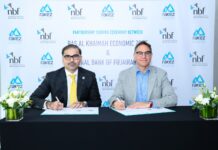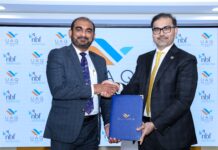Research from HSBC shows that the largest cities across the Middle East, North Africa and Turkey (MENAT) will need to prioritise sustainable innovation, empower human capital, and support new flows of trade if they are to thrive post-COVID-19.
Published on UN World Cities Day, the HSBC City Reports on Abu Dhabi, Cairo, Dubai, Istanbul and Riyadh stress the need for city and business leaders to use the COVID-19 pandemic as a catalyst for more diversified, more digitised, cleaner and greener cities.
Professor Greg Clark, author of the reports and Global Head of Future Cities and New Industries at HSBC, said: “MENAT is home to bustling cosmopolitan cities with extraordinary histories, and these five in particular are primed to set the standard as future global hubs. Their next chapter of growth will depend on how effectively they can work together as a network, and on the individual ability of their economies to drive climate and sustainability-oriented innovation, reinvented trade flows, and the pursuit of human health and happiness.”
The reports analyse how COVID-19 has amplified awareness of the severity of climate change and the urgent need for more sustainable economies and infrastructure. They indicate that COVID-19 is broadening public support for an environmentally responsible future and that today’s relatively low oil prices may be the catalyst for an historic shift towards cleaner energy.
The reports also detail how the pandemic has put a fresh focus on the importance of human health and balanced lifestyles. The reports suggest that governments may be more likely to incentivise medical research and create dedicated schemes to attract and retain talent to support drug development and vaccine discoveries. “Remote healthcare will see a rapid development around telemedicine and the adoption of new monitoring and wearable technologies. We may also see more cities and regions creating coalitions to share health equipment,” added Clark.
The reports highlight that unpredictable levels of lockdown have created a new imperative to reinvent global supply chains and diversify trade relationships. For Middle East cities that have strengthened ties during the pandemic, there are increasing opportunities for complementary development and specialisation across multiple sectors that will serve the wider region.
Daniel Howlett, Regional Head of Commercial Banking for HSBC in the Middle East, North Africa and Turkey, said: “Abu Dhabi, Cairo, Dubai, Istanbul and Riyadh all have legacies of being epicentres of connectivity, diversity, and innovation. They have often served as bridges between East and West, offering internationalists the perfect place to seed and grow their ideas. Their next cycle has the potential to see them become global centres for reinvented flows of trade, more resilient supply chains and revised business models led by digital transformations, which dovetails with HSBC’s priorities in supporting our clients and communities to build back better across the region.”
The HSBC City Reports are part of a wider Future Cities campaign that the bank has launched across the region, which also includes bringing the reports to life in street art that captures the elements of each city’s next cycle of development while paying tribute to their heritage.
Reports will be available at: business.hsbc.ae/en-gb/future-cities
All the artworks have used Airlite paint, which uses a set of patented technologies to absorb carbon dioxide and reduce air pollution.











